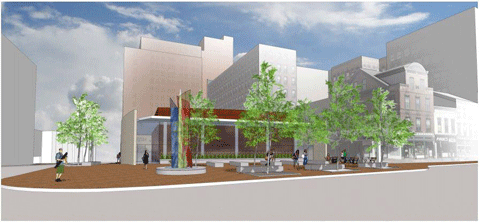Beneath the deep rifts of disagreement about how Portland should grow, change, and develop, there lies one underlying point of concord: The city is increasingly attractive to a wide range of people and businesses, and therefore is uniquely poised to have options about how its future will be built. And there’s another, related area of agreement: Nearly all the players in the ongoing land-use disputes in the city (including municipal leaders) share a list of goals, which include more housing that is more affordable, preservation of historic assets, celebration of unique attributes of the city’s landscape and architecture, and the pivotal importance of energizing the downtown — including but not just maximizing use of open space.
But when faced with choices about how to achieve those goals, Maine’s largest city has of late suffered a gigantic split, between City Hall and the people themselves. And most of these conflicts are similar in one root element: This city, which all agree is lucky to have so many options, has leaders who do not behave as if they have any choice at all. To the frustration of the citzenry, the City Council and the Planning Board often run off with the first partner who asks for a dance.
Sometimes there’s no real controversy, as with the new hotels sprouting around the downtown, the $60-million renovation of the Eastland Park Hotel, or the $110-million redevelopment of Thompson’s Point. But when there is disagreement, a pattern has emerged: citizen outcry builds, corporate interests flex their muscles, the city stands its ground, lawsuits swirl, and the future of Portland gets decided not through a participatory process ending with a majority vote, but in adversarial courtroom hearings before a judge who will make a decision alone.
 CONGRESS SQUARE CONTROVERSY A rendering of RockBridge Capital's proposal for an event center
and open space. |
The most notable issues exemplifying this pattern are the potential sale of Congress Square Plaza, the repurposing of the former Williston-West Church, and the massive Federated “Midtown” housing development in Bayside (see sidebar, “Timelines”). All three have been subjected to long, contentious hearings before the City Council and the Planning Board, as well as several lawsuits, which the city has a track record of losing (see “Legally Blind,” by Al Diamon, February 28).
The projects are different in their details, but looking at their processes is revealing, and worrying. There are interdependent problems, and even if they are solved, the three projects at the center of the current storms are likely lost to litigation forever. That said, a closer look at what ails Portland could help us avoid future maladies.
Diagnosis #1: Bad timing
The first, and perhaps truly the biggest, underlying problem is not a lack of citizen involvement. Ask anyone — board member, citizen, or reporter — who was at any of the multi-hour municipal meetings about these projects.
It’s that the involvement comes too late in the process to really make a big difference. Planning Board member Jack Soley puts it best: “At the eleventh hour it’s difficult to give public testimony as much weight as it is earlier in the project....Their voice will carry more weight at the early stages.”